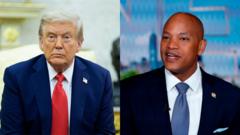President Donald Trump has stirred controversy by threatening to deploy National Guard troops to Baltimore, exacerbating tensions with Maryland Governor Wes Moore. Trump's comments came as a response to an invitation from Moore for a “safety walk” in the city, characterized by the president as “nasty” and "provocative." Trump asserted that if Moore needed assistance, similar to what California Governor Gavin Newsom received in Los Angeles, he would step in to "quickly clean up the Crime." This threat is part of a broader push by Trump to send troops into urban areas managed by Democratic leadership under the guise of crime reduction.
Democrats have been quick to denounce the proposed military involvement in local law enforcement, which Governor Moore deemed “tone deaf and ignorant,” accusing Trump of not understanding the realities faced by Baltimore's residents. He pointed out that Trump's perspective stems from a lack of genuine engagement with the community. Currently, plans indicate the mobilization of about 1,700 National Guardsmen across 19 states, while Trump has already stationed approximately 2,000 troops in Washington, D.C., declaring it much safer than before, despite recent crime statistics indicating a downward trend in violent offenses.
The Pentagon's confirmation that these troops would be armed marks a significant escalation in their intended role, although as of now, they have not directly participated in law enforcement. Notably, crime rates in D.C. have shown significant improvement, according to reports from the Metropolitan Police, contradicting claims of rampant crime made by Trump. As the situation develops, opposition grows, with leaders from various Democratic states calling Trump's actions an overreach of authority, and public sentiment, as suggested by a recent poll, reveals widespread disapproval of the deployment and control of local policing through federal intervention.




















